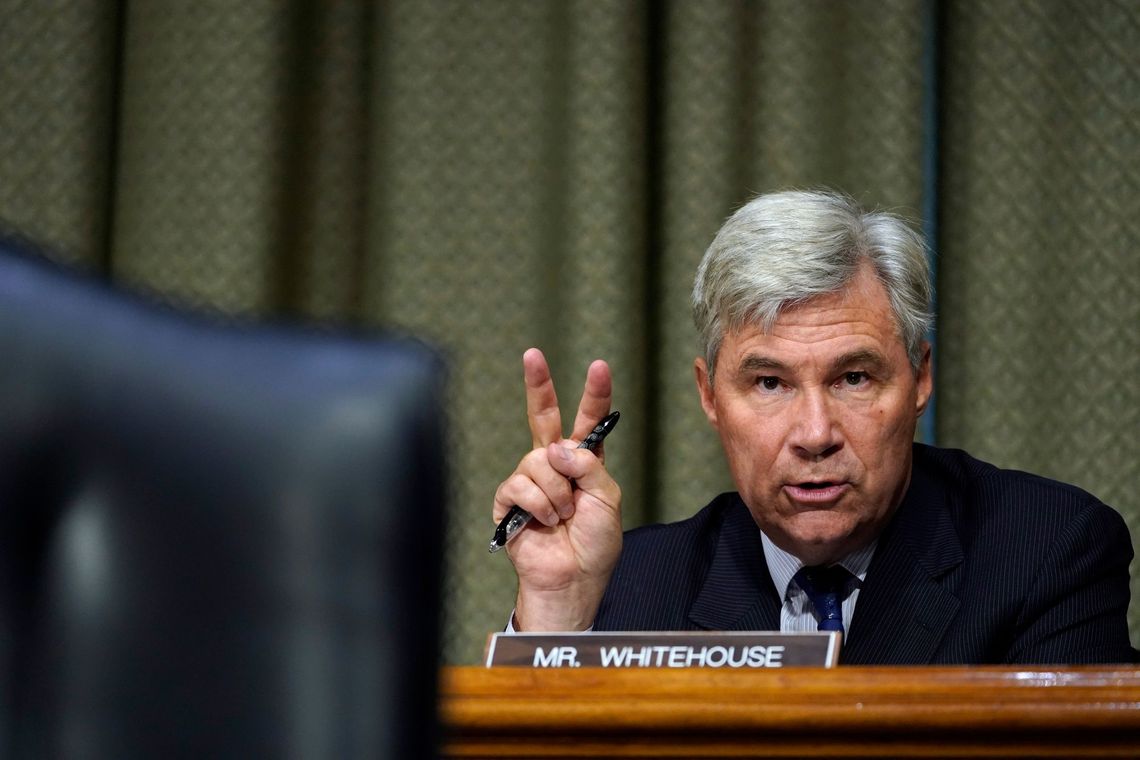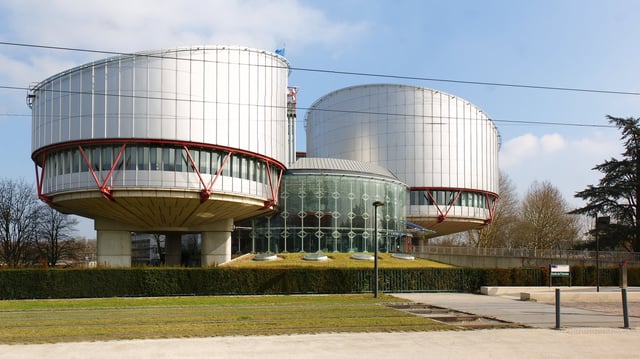
I have been wondering for months what possible sense it makes for every right-wing think tank to have an amicus program. I mean...is any judge really surprised to learn that the Cato Institute is against regulation? But these are not folks who spend money on things for no reason, and the presence and size of amicus programs at conservative "public interest" law firms and think tanks have been growing exponentially over the years, so I reached out to the only person I've ever seen mention this in public: Senator Sheldon Whitehouse. He had all the answers I was looking for and then some.
Transcript
Amy: Today, another super wonky legal thing that I swear to God is fascinating. Amicus briefs. Or Amicus briefs. It's Latin, and I hear lawyers pronounce it both ways. If you know the correct pronunciation, please just share it with me! At any rate, an Amicus or Amicus is Latin for friend.
So these are also sometimes referred to as friend of the court briefs. And way back before the internet and before large accessible libraries, even judges and their clerks couldn't so easily look up other cases that were relevant to the case at hand. So lawyers or other experts would submit these briefs that would point out similarities between the cases they were hearing and previous cases. It evolved over the years to include expert briefs more generally, but in the last decade or so it has morphed into something else entirely, just a mountain of anonymously funded briefs, pushing particular agendas, especially since the passage of Citizens United in 2010, which enabled endless amounts of anonymous corporate funding.
There's just been an explosion. Now, as you might assume, the Supreme court does have disclosure rules about these things. Of course it does, but they're ridiculous! You only have to disclose funding if it went toward the actual hands-on manual production of the brief. So like if Charles Koch paid someone to type that brief, you have to disclose that. But if he funded an entire Amicus program at your think tank, you don't.
Just to give you a sense of how rapidly this is exploding right now amici filed 781 briefs in the 2014 Supreme court term. That was a more than 800 % increase from the 1950s and a 95% increase from 1995. And the number of filings has just continued to rise since then. In the court's 2019 term, amici filed 911 briefs. The 2020 term featured almost 940.
Some high profile cases will even draw more than a hundred amicus briefs. And there's another disturbing trend: amici showing up at the certiori stage, or cert. That's the phase when the Supreme court is being petitioned to hear a case or reject it. Between 1982 and 2014, the percentage of petitions with at least one cert stage amicus more than doubled.
When I first started looking into this, it really didn't make sense because I thought is any judge really going to be surprised or swayed by a brief from the Cato Institute that says, we don't think you should regulate business? No, but here's the thing they're not swayed by the organization.
They're swayed by the attorney representing them. And any good amicus program worth it's dark money knows which lawyers will get which judges' attention at the cert stage. These connected lawyers can improve the chances of the court viewing the case as cert-worthy. At any stage seasoned members of the Supreme court bar add credibility to Amicus briefs. The late justice, Ruth Ginsburg actually talked about this in a 2008 interview. She said, "clerks often divide the Amicus briefs into three piles. Those that you can skip entirely. Those that should be skimmed. And those that should be read in full. If the attorneys submitting the Amicus brief has significant experience before the court, it would be more likely that their brief would be placed in a higher priority pile."
So it is actually an effective strategy. And more and more Supreme court justices are actually citing Amicus briefs in their rulings. From 2008 to 2013, the Supreme court cited amicus 606 times in 417 opinions. Between the 1994 and 2003 terms, the court's majority opinion referenced an Amicus brief only 38% of the time.
And in earlier terms like 1946 to 1955, it was less than 20% of the time. So it's gone from. 18% in the fifties to more than a hundred percent today. Another tactic folks will use with an Amicus briefs is to gather so many of them that it gives the justices the sense that there's some kind of consensus behind one side or the other.
Of course what all of this points to is the ability of people with deep pockets to tilt the courts in their favor. You would think that the Supreme court would just improve its disclosure requirements and be done with it. But for some reason, it hasn't done that. So in the meantime, Sheldon Whitehouse, the Senator from the great state of Rhode Island has proposed legislation that would force the issue.
He's here today to walk us through that legislation and why the Supreme court resists transparency, and how this whole Amicus thing is really messing with democracy. That's coming up after this quick break,
Senator Whitehouse: You press on the Supreme court to take action. And their first response is to pretend that there's no problem. And then you keep pressing and, um, ultimately within the judiciary, somebody realizes, okay, there actually is a problem. And, um, they'd begin to do some work on it. I don't know whether that's quietly blessed by the Supreme court or despite the Supreme court, but it's happened twice.
It happened first on amicus disclosure where the Supreme court said nothing to see here, not a problem, go away, but then the judicial conference said, okay, this is actually a really serious question. And they set up a special committee to look into it. And judge Mollette, um, as a part of that discussion in the public, uh, meeting, I guess said, Hey, we really got to know who the power is behind the throne on these Amicus briefs.
And she's obviously a respected DC circuit court of appeals judge. So, um, despite the Supreme court's indifference that has been taken up within the federal judiciary. And then recently the, um, peculiar failure of the court to disclose, um, gifts in the form of so-called personal hospitality, which as read by the Supreme court does not require that you even know the person who's giving you personal hospitality, not exactly the customary definition of the word personal.
But again, I wrote a letter asking for an explanation to all the different circuit courts of appeal and after ignoring it for quite a long time on the Eve of our hearing, uh, the circuit court. Sent in a joint response. I think again, through the judicial conference saying, okay, you're right, this is serious.
And we're going to have a group of people look at it once again. I don't know if that is despite the Supreme court or because they got a quiet signal from the Supreme court saying you better, you better look into this. Whitehouse isn't going away. Now that's twice that we've been through the same routine with them, which is they pretend that everything is fine. And it's only when you persist that somebody then acknowledges no, it is not fine. It is really wrong. And now we have these ongoing reviews, but it would be far better if the court from the get go took this seriously and took it up, you know, of its own volition. And didn't put us through all these delays and prevarications.
Amy: Do you think there's a sense that the threat of Congress legislating this versus them setting their own rules kind of drives that along as well? Like makes them take it more seriously?
Senator Whitehouse: Lord knows what, what the reason is for them to be so obtuse about what seemed to be unbelievably obvious ethics and conflicts problems. But I do think that knowing that Congress isn't going away has created some faint with, of accountability, at least in the judicial conference, if not in the Supreme.
It seems to me and please correct me if I'm wrong, but it seems to me like in a lot of these cases, the justices themselves probably do have some inkling of who's funding what, but this would provide more transparency for the public. Is that, is that accurate or do you think that judges themselves are often in the dark too?
To the extent that Supreme Court justices are in the dark about who is behind some of these, that is a case of willful blindness. Because they often, they often go and sit with these groups and with their funders at Federalist society dinner. When all the chums come together. So if, if, if you can't figure that out, as you're sitting at the Federalist society gala at the table with front group organizations and those who fund them, then you have a problem of perspicacity unbecoming of a judge.
The problem is if everybody knew, right then the story would get far worse for the court. Because what we have right now is these little flotillas of right-wing amici show up, they ask the court to do X. The court almost invariably does X or at least some part of X, and there's a stunning win rate.
And if it were public who was behind those briefs, it would make the problem of the win rate look even worse. Right. It would cross reference likely with funders of republican senators who participated in packing the court with these right wing operative judges. And it would trace back to entities funding, the selection of these very justices.
Amy: Right.
Senator Whitehouse: They know enough to know that this is a world in which they don't like, they don't want the information to get out there because of their own problem.
Amy: Right, right. I read your Yale law journal article again this morning. And I know you noted a few different groups that show up a lot. Are there any particular attorneys who, are kind of like popular picks of these groups To be counsel on these briefs?
Senator Whitehouse: Yes, there are. And I just don't have them top of mind, but there are some pretty regular frequent flyers in the legal regime around this, the most obvious one who comes to mind right now in the wake of this wretched Cruz versus federal election commission decision is Don McGahn.
Amy: Right.
Senator Whitehouse: Don McGahn who picked the last three judges or was told who to pick by the Federalist Society, White House counsel during their selection. Let's put it that way. And Mitch McConnell, who orchestrated their confirmation through extraordinary obstacles, like for instance, faking an FBI background investigation. Faking an FBI supplemental background investigation for Kavanaugh. They're on the same brief telling the court what to do, and gee, big surprise the court does as instructed.
But I mean, if you want it, if you want to look at it like quick payback loop, FEC is like the perfect. That case in general is pretty stunning on multiple levels, but also totally predictable because the Federalist society justices are absolutely determined to expand the role of dark money for very obvious, but also very unfortunate political reasons.
Amy: I'm assuming that there are various dark money funded efforts against these disclosures. Have you come up against any, I don't know, obvious kind of, um, dark money funded opposition to improving disclosure and transparency?
Senator Whitehouse: Yes. I mean, there's a whole, Right-wing media operation to try to discredit it right. And to point out that it's, hypocritical of Democrats to play by the rules. And at the same time, want to clean up the rules. That's not an actual hypocrisy, but they frame it as one as part of their narrative. So you certainly see that in action.
And of course, there's this mad rush for the court to build a constitutional right to dark money. We'll get ahead of our legislation requiring disclosure of dark money. And if you want to go to the case in which they did that, I mean, it's just a beauty of a case called Americans for prosperity foundation versus Bonta, at the end of the day. We went through a number of respondents as the officials changed in California, but Americans for prosperity foundation, which is the 5 0 1 C3, three twin to the Koch brothers' 5 0 1 C4 battleship Americans for prosperity, with massive overlap between the two: same address, overlapping boards, same staff.
You could pierce the corporate veil between the two with a banana, and they pick Americans for prosperity foundation as the petitioner to try to get this dark money constitutional right. To have a foundation. And when they do that, 50, at least 50 it's actually more, but it gets harder and harder to prove as you got into these small groups with no records, but at least 50 dark money, amici showed up at the certiorari stage.
And the cert stage to push the Supreme court to take up this case. And by the way, it lurked for a very long, strange period of time at the Supreme court. And they only took it up once they had judge Barrett giving them six and they only took it up literally two days after the attack on the Capitol, when everybody in America was looking elsewhere.
Wow. January 8th, they took the case up. So they've got the case of the twin of the Koch brothers, political battleship supported by 50 dark money front groups that they take onto their docket in the shadow of the attack, on the Capitol. And sure enough, they created a constitutional right to dark money for this group.
Amy: Right. Right. I've been looking at this with respect to the, um, the climate cases, because the very specific argument they're making about political speech in those cases is, um, I dunno, it, it keeps jumping out to me as like a broadening of this stuff. And I think they're going to try to get it to the Supreme court and blur the line between fraud and lying.
Senator Whitehouse: Absolutely. Absolutely. I think if you look at the tobacco fraud case with the department of justice, one, it makes an extremely good template for a climate fraud case. Against the fossil fuel industry, the Supreme court never took it up, but DOJ won big and just devastating decision by the DC district court, which was powerfully upheld in a unanimous decision by the DC circuit court of appeals. And the Supreme court declined to review it. So that's floating out there as a template and a way to end corporate fraud, but just, you wait for these guys to say that, oh, well, when it's a petition in government, right, exactly then there's special protection here. And the government of all people it was in the worst possible position to police fraud against itself because they treat government as an interested party rather than as the popular summation of the public will. Right. So, yeah, you could see that you could see that coming just as clearly as you could see the AFPF case coming.
Amy: Yeah. Thank you so much for your time and I'll keep you guys posted
Senator Whitehouse: Keep on this, there's lots of good material and we haven't been getting anywhere near enough attention. So thank you.
Amy: Thank you. Have a good rest of your day.
That's it for this time. Thanks for listening. And we'll see you next week.


